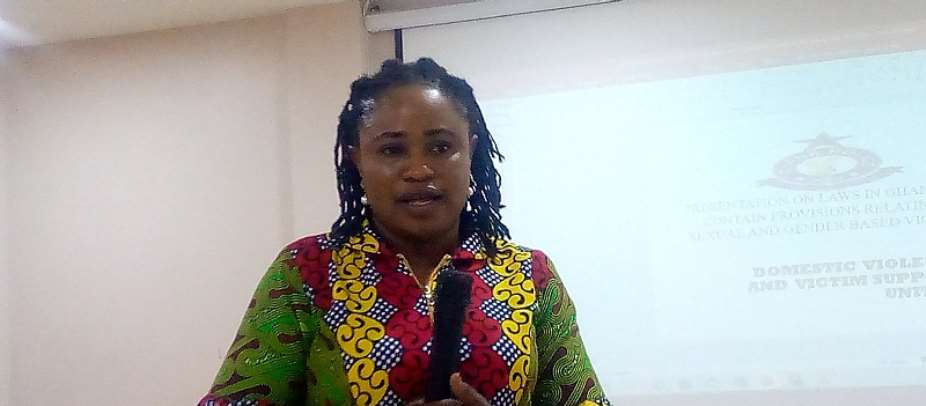The Ministry of Gender, Child and Social Protection through its domestic violence secretariat in partnership with the Christian Health Association of Ghana (CHAG) has organized a 3-day stakeholders sensitization programme in Sunyani, Bono Region to build their capacity as community level players, to enable them play their various roles in response to issues of Child marriage, Sexual and Gender Based violence (SGBV), HIV and Tuberculosis (TB) at the various communities.
It also highlighted the issues of SGBV and their vulnerability to HIV and TB.
Mrs. Joycelyn Adii, Bono Regional Director of Gender in her presentation on ‘overview of sexual and gender based violence’ said violence takes many forms, including physical violence (hitting, kicking, or pushing), sexual violence (rape or sexual assault), emotional or psychological violence (verbal abuse or intimidation), and structural violence (systemic discrimination or economic exploitation).
She added that violence have serious consequences for individuals, communities, and society as a whole adding that, it was important to work towards preventing and addressing it in all its forms.
Mrs. Joycelyn noted that there was a strong link between Sexual and Gender-Based Violence (SGBV) and HIV. She clarified that SGBV was a human rights violation and public health issue that affects individuals, families, and communities globally. She added that the link between SGBV and HIV was complex and multifaceted, with several interrelated factors contributing to the association between the two.
Mrs. Saphia Tamimu, a Senior Programme Officer at the Domestic Violence Secretariat of the Gender Ministry in her presentation on Intimacy Partner Violence (IPV) noted that about 30% of women aged 15 and over have experienced physical and/or sexual Intimacy Partner Violence (IPV) during their lifetime. She related that in 2016 a study on Domestic Violence in Ghana found that men were more likely to become violent when their expectation of being obeyed was not fulfilled by their wives, or when wives failed to perform expected domestic roles, such as ensuring their meals were ready on time, or refused to have sex. She cited that from the Northern region the study revealed that, societal norms governing expectations about women made them more acceptance of abusive relationships.
The Senior Programme Officer called on the stakeholders to give support to women who disclose any form of violence by an intimate partner (or other family member) or sexual assault by any perpetrator to guarantee their safety.
ASP Beatrice Korsah, the Bono Regional Coordinator for Domestic Violence and Victim Support Unit (DOVVSU) in her presentation said victim who were injured, raped, defiled, or assaulted are issued with Police Medical Report Form for a doctor’s examination and treatment. She added that doctor will examines the victim for traces of bruises, semen, blood and then writes the report. She advised that the medical form is free and encourage that victims to report their cases to the Police.
Nana Kwaku Sarbeng, Akwamuhene of the Sunyani Traditional Area who was a participant said nananom have been resolving similar issues under the Alternative Dispute Resolution and Arbitration and assured that the chiefs and Queen mothers were looking forward to smooth working relation with the Gender Ministry and its partners.
The targets stakeholders she said include Chiefs and Queen mothers, opinion and religious leaders, Assembly men and women, Gender Desk Officer of Regional Coordinating Councils and District Assemblies.
A total of 65 participants attended the 3-day programme in Sunyani.
 Participants At The Training
Participants At The Training
 Group Pic At Training -
Group Pic At Training -





 Dialysis crisis: Because they can travel outside for healthcare they don’t care ...
Dialysis crisis: Because they can travel outside for healthcare they don’t care ...
 Stop intimidating us with court — Cocoa Fertiliser Distributors blast insurance ...
Stop intimidating us with court — Cocoa Fertiliser Distributors blast insurance ...
 OSP investigates Nana Oye Over South Africa mansion
OSP investigates Nana Oye Over South Africa mansion
 Chief Justice did no wrong with changes on Dr. Opuni’s appeal panel – AG
Chief Justice did no wrong with changes on Dr. Opuni’s appeal panel – AG
 Ato Forson’s case: Govt’s inaction led to ambulance issues – Third accused
Ato Forson’s case: Govt’s inaction led to ambulance issues – Third accused
 National Commission on Culture staff demand resignation of management
National Commission on Culture staff demand resignation of management
 Imani's Bright Simons makes RTI request on KMA's missing GH¢3.6million
Imani's Bright Simons makes RTI request on KMA's missing GH¢3.6million
 Delay in approving new ministers affecting govt business – Fatimatu Abubakar
Delay in approving new ministers affecting govt business – Fatimatu Abubakar
 “Now that I'm a citizen of Ghana, my goal is to bring people together" – Stevie ...
“Now that I'm a citizen of Ghana, my goal is to bring people together" – Stevie ...
 Nana Oye Bampoh sues ex-husband Tony Lithur, demands US$1.5million damages
Nana Oye Bampoh sues ex-husband Tony Lithur, demands US$1.5million damages
